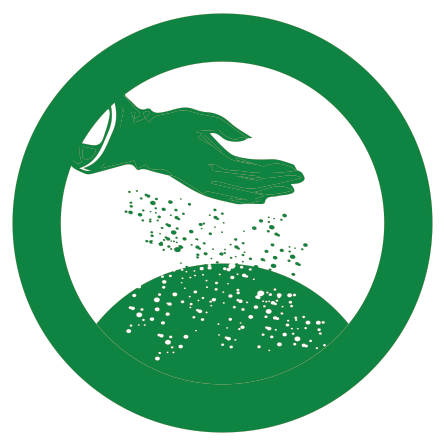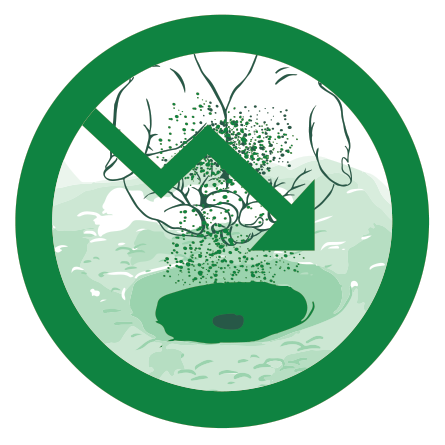FERTILIZER IN THE WORLD
By the year 2050, we’ll need twice the amount of food from the same acreage we use now to feed the world. That’s going to take some serious innovation. Agriculture Remains Central to the World Economy. 60% of the Population Depends on Agriculture for Survival.
the danger and disadvantage of using chemical fertilizer
Agriculture remains central to
the world economy. 60% Of the
population depends on agriculture
for survival.
Over 42 billion people use
conventional Agriculture practices
by relying heavily on Chemical
Fertilizer and pesticides.
The Disadvantage
• High cost
• High weight
• Storage
• Inferior crops
• Low yields
• Lower selling price
• Costly logistic
The Harm
• Health
• Environment
• Soil quality
HARMFUL EFFECTS
OF USING CHEMICAL
FERTILIZERS
The use of Chemical Fertilizers is a dated agricultural method we have seen implemented since the 1930s. Chemical Fertilizers or Inorganic Fertilizers are created to provide a number of nutrients that are found in natural soil, that are essential to plant growth. These synthetically manufactured materials aid in the growth of plants, but only for short periods of time, making Chemical Fertilizers a poor agricultural choice for long-term sustainable farming practices. We are beginning to see detrimental effects on the Environment, Human Health, along with Plant and Animal life, all caused by the use of these Chemical and Inorganic Fertilizers.
NATURE & THE ENVIRONMENT
- Chemical fertilizers are packed full of inorganic and synthesized elements, such as Nitrogen, Phosphorus, and Potassium (NPK) along with many other nutrients and components.
- While these minerals can aid in plant growth, they neglect the health of the soil completely, and the buildup in these chemicals and nutrients is a result of the severe environmental effects that we are seeing today.
BODIES OF WATER
- Chemical Fertilizers are full of inorganic and synthetic minerals and materials that are extremely detrimental to the environment through excessive use over time.
- Toxic buildup of these inorganic components are being leaked into bodies of water through rainfall and sewage, disrupting and destroying aquatic life.
HUMAN HEALTH
- A serious issue we are seeing from these synthetic materials being leaked into our water systems is that our groundwater and drinking waters are being affected.
- High levels of these chemicals are in our drinking water, and it is causing serious health issues such as; Blue Baby Syndrome, Cancers, Asthma, Autism and other learning disabilities, birth defects, reproduction dysfunction, diabetes, and both Alzheimer’s and Parkinson’s Disease.
CLIMATE CHANGES
- High levels of Methane, Carbon Dioxide, Ammonia and Nitrogen are produced from the use of Chemical Fertilizers. These components have greatly contributed to the Global Warming that we see the effects of today.
- The third leading cause of greenhouse gas is Nitrous Oxide, which is the byproduct of Nitrogen, followed by Carbon Dioxide and Methane.
SOIL HEALTH & QUALITY
- Soil Tests being done once every three years is recommended to ensure that you are using the correct amounts of fertilizers, preventing overuse.
- This is because when using these chemical fertilizers, it increases the acid levels of the soil, altering its long-term productivity.
- Creating desertification of the world where soil is not able to sustain life.
OUR SOLUTION
SUSTAINABLE REGENERATIVE AND CARBON FARMING
WHAT IS THE DIFFERENCE?
Lightweight, Simplistic, Sustainable & cost efficient.
OMRI
Listed formulations for use in the production of organic foods and fibers.
RESULTS YOU CAN SEE
In under 30 days.
LIGHTWEIGHT
Only one 1kg unit required per Hectare, per Crop compared to 500kg of Chemical Fertilizer
BENEFIT
• AFFORDABLE
A huge saving of $200-$300 USD per Hectare, per Crop. Up to 50% saving on input cost.
• UP TO 50% YIELD INCREASING
Providing the farmer with a much higher income on their crops.
• HIGHER NUTRITION VALUE
And higher Brix level for better tasting fruits, and command a higher price
for being organic. Improve human and animal health.
• MINIMAL TRANPORT COST
• UP TO 50% WATER SAVING
• HUMAN AND PET SAFE
• ENVIRONMENT-FRIENDLY
Improve air, water and soil quality.
• REGENERATE AND PROTECT SOIL FOR FUTURE GENERATION
• MAXIMIRE PROFIT FOR FARMER
Environmental Friendly – MicrobeBio® microbes aerate and regenerate soil health, resulting in better absorption, less run-off and a significant increase in water efficiency. Microbes do not cause run-off, leach through the soil, or cause any damages to aquifers, rivers or lakes, as Synthetic Fertilizers do. Microbes contain no harsh chemicals or heavy metals, making them completely safe to use around both humans and animals. Because microbes are organic and regenerative, they tend to remain in the soil much longer than traditional fertilizers. MicrobeBio Bioremediation helps reduce and remove the pollution produced, providing clean water, air, and healthy soils for the future generations. This results in a Win-Win for farmers, consumers, and most importantly – the environment.
The Microbebio Symbiotic Cycle – Microbebio products help increase photosynthesizes, giving more sunlight energy in the form of carbon compounds to increase the transfer of proteins, carbohydrates and nutrients into the root area. In return, this feeds the army of Microbebio beneficial bacteria in such a way that they will protect and stimulate crop growth and production. Microbebio products replenish and exponentially increase the beneficial bacteria that have coexisted in the soil for millions of years, enhancing the symbiotic cycle for the plants. For example, microbes make essential elements such as nitrogen and phosphorus available in exchange for the carbon provided by plants. MicrobeBio® microbes act as a nutrient agent, allowing the plant to utilize more of the bio-available essential nutrients within the soil. Rather than being washed through the soil or locked in a form that plants cannot use, the plants can absorb these nutrients through the stem, leaves and root arbuscules. MicrobeBio® products help in the assimilation of micro and macro nutrients supplied to the plants, promoting growth and crop development, enhancing flowering fruit set, increasing quality and production, as well as improving the color, size and consistency of the crop.
Increase Yield – MicrobeBio® microbes free the carbon and other essential nutrients by effectively breaking down and increasing the organic matter found in the soil. This balances soil pH and reduces soil salinity, returning them to biological circulation. Microbes also provide amino acids, which are the basic building blocks of proteins, in which other fertilizers don’t include. These amino acids are fundamental to maximize growth and correct any nutrient deficiencies in the pant.
Bigger Healthier Faster – MicrobeBio® reintroduces billions of beneficial worker microbes, in which their sole purpose is to better the surrounding environment and rebalance the soil, allowing the plants to grow bigger, healthier, and stronger. These beneficial microbes are converted into nitrogen, various nutrients and organic phosphates in the soil, that the plants then use to become healthier and more resistant to disease and pests. This allows the plant to bloom more, producing bigger, healthier and better tasting fruit, with less maintenance
Increase Root Mass – MicrobeBio® microbes colonize the root zone with a number of diverse beneficial microorganisms, which essentially increases the root mass. This allows the plant to access additional nutrients deeper within the soil and supports greater water absorption, leading to less watering and an increased drought resistance. The plant roots and the microbes work together in a symbiotic relationship to benefit each other. The plant releases sugar and carbon from photosynthesis to attract and feed the microbes to further satisfy their nutritional needs. In return, the microbes form a structure known as arbuscules, allowing the plant to receive phosphorus, sulfur, nitrogen, along with many other micronutrients within the soil, air and water to help the plant reach its optimum potential.
THE MICROBEBIO SYMBIOTIC CYCLE
THE PLANT FEED THE
SOIL ORGANISMS
SOIL ORGANISMS FEED
THE PLANT
LIGHTWEIGHT, SIMPLISTIC,
SUBTAINABLE &
COST EFFICIENT
INCREASE QUALITY AND YIELD
ENHANCED RESISTANCE TO DISEASE, PEST AND STRESS
MAXIMIZE PROFITS FOR THE FARMER
REVITALIZE AIR, WATER AND SOIL
ENVIRONMENTALLY FRIENDLY
MINIMAL LOGISTIC COST
DECREASED IRRIGATION
EXTENDED SHELF LIFE
HUMAN AND PET SAFE
100%
ORGANIC


INCREASE ORGANIC MATTER

ENHANCES WATER HOLDING CAPACITY

IMPROVED ROOT DEPTH AND DENSITY

STIMULATES MICROBEBIAL ACTIVITY

INCREASE CARBON

DECREASE IRRIGATION

REDUCE FERTILIZER

INCREASE YIELD
INTRODUCE MICROBEBIO SOLUTION
MicrobeBio® is an OMRI listed formulation for use in the production of organic foods and fibers a “bio-cocktail” of 50+ beneficial soil microbes which enhance soil life. Our proprietary combination of microbial strains works in sequence to boost nutrient-uptake in plants, improve plant vigor, and stimulate microbial and bio-diversity activity in the soil which contributes to drought tolerance and increase plant performance.
MicrobeBio® works synergistically with organic nutrients to help improve soil sustainability. Each microbe strain in the chain is critical as it plays an important role in regenerating, decomposing (composting), and protecting against pathogens to improve plant vigor, soil quality, and crop yields
NATURAL
Chemical and GMO-FREE
100% Organic
COMPLIES WITH NATIONAL
ORGANIC PROGRAM FOR USE
IN ORGANIC PRODUCTION

approved by
MINISTRY OF AGRICUTURE